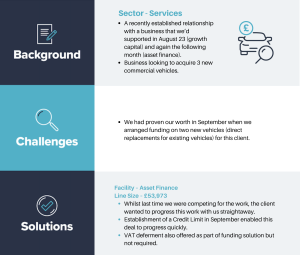Award-winning commercial finance specialist CCBS Group has completed a management buyout, positioning the North East business for a dynamic new chapter following the celebration of its 10th anniversary last year.
The buyout sees Graeme Harrison, who joined CCBS five years ago to drive business development, take over as Managing Director. Founder Peter Cromarty, who established CCBS in 2014, will remain involved as Non-Executive Chairman, supporting the leadership team and continuing to work closely with clients.
Graeme Harrison said:
“We’ve built a resilient, client-focused business with an unwavering passion for delivering exceptional results for our clients. This transition marks an exciting new phase, and I’m looking forward to working with Michael Horner, Matt Lister, and the wider team to bring our ambitious plans to life.”
CCBS Group, known for its expertise in delivering bespoke funding solutions for businesses across the North East, has experienced consistent year-on-year growth since its inception. The company prides itself on providing clear, strategic advice for clients navigating funding landscapes, particularly during uncertain times and when traditional routes may be unavailable due to complex factors.
Reflecting on the journey to date, Peter Cromarty commented:
“It’s been an incredible journey, building CCBS from a one-man operation to a leading independent finance boutique with a team boasting over 125 years of lending experience. We’ve supported businesses through every stage of growth – from acquisitions and management buyouts to international expansion. I’m immensely proud of everything we’ve achieved, and I’m excited to see the business continue to flourish under Graeme’s leadership and the new management team.”
The strategic move, advised by Square One Law and BK Plus, ensures the business remains independently owned and firmly rooted in the North East. Management team members received legal and financial advice from Clark Mairs and The Advisory Group, helping to secure a seamless transaction process that underpins CCBS’s ambitions for long-term growth.
Harrison added:
“While to the outside world CCBS will look very much the same, this internal evolution strengthens our ability to deliver even more for our clients. Our ethos remains firmly in place – understanding client needs and delivering exceptional funding outcomes — but with a renewed energy and shared vision for the future. With our experienced leadership team, robust network of funders, and unwavering commitment to the businesses we serve, we are well placed for another decade of success.”
Looking ahead, CCBS plans to continue expanding its presence across the North East, building on its strong reputation for client service, industry expertise, and resilience. Recent investments, including the opening of a new office in Teesside, reflect the company’s ambition to support even more businesses across the region.
Harrison concluded:
“This is a proud moment for the team. We are passionate about the future and committed to growing CCBS in a way that stays true to our culture and values, and contributes positively to the North East business community.”
Let’s face it – sometimes business gets bumpy. And cashflow can suddenly feel like trying to fill a bath with a sieve. Enter short term secured finance: the unsung hero of business funding – and quite possibly the thing that keeps your plans from being parked indefinitely.
So, what is short term secured finance?
In the simplest terms, it’s borrowing money over a short period (typically 3 to 24 months) using an asset – like property, machinery, or invoices – as security. It’s fast, flexible, and usually less faff than a traditional bank loan. Ideal when time is tight and your business needs to move quickly.
When does it make sense?
You might consider short term secured finance when:
- A big opportunity has landed in your lap but your cashflow hasn’t caught up yet.
- You’re in the middle of a property deal that needs bridging.
- You’re buying out a business partner or chasing growth that needs quick capital.
- You’ve got HMRC breathing down your neck and need a short-term solution.
It’s not for keeping the lights on long-term—it’s the “get-it-done-now” option when you need money fast and you’ve got the assets to back it.
Not all lenders are created equal, and not every deal is a good one. That’s why working with the right broker — cough — makes all the difference. We get under the bonnet of your business, figure out what’s really needed, and then pull in the right funding match faster than you can say “short-term cash injection”.
Get in touch to discuss whether short term secured finance could help you over the next few months.
This month, we’re celebrating our 10th anniversary, a significant milestone for our team.
Founded by Peter Cromarty in 2014, CCBS has grown from a one-man operation working out of a home office to a thriving team with over 125 years of combined industry experience, headquartered in Newcastle with a new office in Teesside.
Reflecting on a decade of consistent growth, Peter acknowledges the journey has been marked by both triumphs and challenges:
“When I launched CCBS, we were emerging from the shadows of the 2008 banking crisis, and the funding landscape was shifting dramatically. Little did we know the curveballs still to come – Brexit, a pandemic, and political instability have all shaken the finance world. Yet, despite it all, our focus on supporting North East businesses has kept us strong and adaptable. There’s a lot of pride in reaching this 10-year mark.”
Our journey is peppered with milestones: from our first hire, Matt Lister, to its recent addition of Michael Horner, each team member has been instrumental in our commitment to finding tailored finance solutions for clients. We’ve also enjoyed a decade of steady year-on-year growth, which Peter credits to a team driven by clarity, expertise, and a genuine desire to see North East businesses thrive:
“Our success is built on putting people and relationships first. Navigating an ever-shifting finance landscape requires an in-depth understanding of not just numbers but the businesses and aspirations behind them. We pride ourselves on being trusted advisers who can guide clients through any storm.”
Looking ahead to the next ten years, we’re focused on expanding our service offerings while maintaining the high standards of personal service. We’ll be embracing new technology and as always, getting out and about to meet our clients and intermediaries across the region.
We’ve been busy with a wide variety of deals this summer – check out our Q3 highlights reel which showcases how we approached some of our clients’ challenging situations…
If you would like to talk to the team about your, or your client’s, situation – contact us today for an informal chat.

I founded CCBS in 2014 after a number of roles working for financial institutions predominantly in the asset-based lending space. The role initially was to help North East entrepreneurs and business owners navigate the new funding landscape that had arisen after the banking crisis of 2008. The commercial finance brokerage element quickly moved to a little more than that, where we provide support to businesses around cashflow processes and often being a sounding board to clients who need help on strategic business decisions
What is your specialism in the team?
Other than running CCBS as a business, which takes more and more time as we grow, I mostly focus on all matters working capital finance. I have a lot of experience over the years, in corporate finance and corporate recovery transactions, which tends to help clients and professional intermediaries on deals.
What is a typical day like for you at CCBS?
The beauty about CCBS is that there isn’t a typical day, but it will consist of working on existing transactions with clients and intermediaries and looking for new ones too. That, interspersed with the nitty gritty of running the business and strategic planning, and supporting the team as best I can pretty much fills the time.
What do you do in your spare time?
I used to play a lot of rugby and cricket back in the day but I’m confined to watching those sports now. My real passion now is golf and I really enjoy playing socially and competitively in weekly competitions at Close House Golf Club where I’m a member. Other than that, spending time socially with my family and friends and also travelling.
Have you ever played golf naked?
Only once before and it was so cold the head fell off my mashie niblick.
If you weren’t Managing Director at CCBS, what job would you be doing?
Well if I had my choice I would be in a band, probably a lead singer and/or lead guitarist. On the basis I can’t play the guitar and I’m a dodgy karaoke singer at best then I think this was never going to be a reality, so realistically I think I would have been an insolvency practitioner as it’s the easiest job in the world.

I’m a Debt Recovery Specialist so I support and improve collections processes for companies across all industry sectors. I’ve been doing this for over 20 years, working for asset-based lenders and accountancy firms.
What is a typical day like for you at CCBS?
I visit customers onsite to secure and back up all the information and documentation relevant to maximising recoveries then head back to the office to complete a full assessment of recoverability of the Sales Ledger. This includes pulling together a detailed report highlighting best and worse case scenarios with cashflow recovery forecasts and reconciliations.
What do you do in your spare time?
I have two boys aged 13 and 11, and a 3-year-old cocker spaniel called Stanley. I’m mostly a Mam Taxi to their hobbies and clubs like karate championships and swimming! I like pilates and yoga and my husband and I have a property management and holiday let business which takes up a lot of spare time too.
If you weren’t Debt Recovery Specialist at CCBS, what other job would like to be doing?
I’d like to be a professional sleeper and food critic (just for the grub)!

My role is Relationship Development Director. I lead client engagement and retention at CCBS, supporting the team to maintain and develop their relationships with existing clients and nurturing my own client relationships. This includes initiatives such as the monthly client newsletter and events throughout the year. My focus is very much on our clients, I work for them and try to find them the best deal I can – the funders are very much part of what we do but our job is always to find the right funder for the client and their situation.
Prior to joining CCBS Group in May 2023, I spent 36 years working for NatWest in various roles, and that is where I first met Peter and Matt. In the last 20 years at the bank I was a Relationship Director, very similar to what I do now, but it has been great to work for an independent small business here in the North East and build some really strong relationships across the sector.
What is your specialism in the team?
I don’t have a specialism as such, but I do like looking at trading businesses who are looking to grow and need funding to assist this growth. That could take the shape of asset finance, invoice finance or indeed growth capital. The interesting thing is that working for CCBS Group allows me to look at a much wider suite of lending products than I was ever able to do in previous jobs. For example at NatWest I would bring in an asset finance colleague to support on a deal, whereas at CCBS I am doing that in conjunction with a funder.
What is a typical day like for you at CCBS?
I will start with what a typical week looks like as I now don’t work on a Monday or a Friday, so my working week is Tuesday, Wednesday and Thursday. I will let you work out the acronym. The theory of reducing your working week sounds easy although the reality is a little different especially having worked full time for over 35 years. I am well organised and that is a key thing that you need when reducing your working week. I still check emails on a Monday and Friday so that when I get to work on a Tuesday, I know what needs to be done. I don’t want to spend the first hour of Tuesday wading through emails. A typical working day involves coming into the office – I do not want to do my job sitting at home on my own – there is too much to learn and I couldn’t do it there. I always try and have at least one meeting per day with either clients, intermediaries, or funders. The rest of my time is spent progressing deals.
What do you do in your spare time?
Now I have a little more of that, my plan is to spend some of that with Helen (my wife) as she doesn’t work on a Friday and riding my bike (on a Monday when Helen is at work). I must admit that I have become a fair-weather cyclist during the winter and need to get my act together and get back on the roads and tracks. I have some cycling targets (ride 100km a week and more than same week last year) and I am ahead of both.
Have you ever tried cycling naked?
Only in the garage (door shut) BUT had to wear my shoes to clip into the pedals. So – not 100% naked.
If you weren’t the Relationship Development Director at CCBS, what other job would you like to be doing?
When I was little (believe it or not I was once) I wanted to be an astronaut. Obviously, for a number of reasons that wasn’t going to happen, and I realised that quite quickly. Over the years I have spent a lot of time playing sport (mostly rugby) and coaching (football). The latter for the last 10 years and predominantly because my son played for the teams that I have coached. I really enjoy coaching (even U18s) and do think that I would have liked to have gone down that route as a career albeit that ship has sailed.
You can contact Steve to discuss any finance queries or situations by emailing steven@ccbsg.co.uk or calling the office on 0191 211 1450.
 Did you know that there are grants available for businesses across the North East open NOW – from support with capital expenditure and creation of jobs, to setting up apprenticeships and installing EV charging points – that you could apply for?
Did you know that there are grants available for businesses across the North East open NOW – from support with capital expenditure and creation of jobs, to setting up apprenticeships and installing EV charging points – that you could apply for?
Find out more below and contact us for further information:
- Durham Business Growth Programme
Grants from £10,000 – £200,000 for eligible businesses investing more than £25,000 in County Durham. Grants of up to £10,000 are also available to support third party consultancy costs. - Business Growth Fund
This fund offers discretionary grants from £20,000 up to £300,000 for businesses investing in Northumberland, North Tyneside, Newcastle, Gateshead and Sunderland local authority areas. - Northumberland Small Business Service
This service can offer grant support from £10,000 to £300,000 to small businesses in rural areas of Northumberland who are investing in capital expenditure. - North of Tyne Inward Investment Fund
Supporting new inward investors into Newcastle, North Tyneside and Northumberland local authority areas. This fund can offer grant support of between £100,000 and £1m on eligible projects. (Investments must be linked to job outputs) - Made Smarter Adoption
Support and funding opportunities for small and medium-sized manufacturing businesses in the North East LEP and Tees Valley LEP areas.- Grants of up to £3.5k available for expert technical advice
- Grants of up to £20k available for purchases of new software and/or equipment (up to 50% of the overall cost)
- RTC North
Grant funding to support innovation and new ideas for businesses e.g. from expansion, developing new products/services, leadership development and getting help with strategic planning and skills. Must be based in the NELEP area, have an annual turnover of less than £50m, operate in an ERDF eligible sector and have fewer than 250 employees. - Electric Vehicle Infrastructure grants (Workplace Charging Scheme)
This grant is for small and medium-sized businesses to provide money off the cost of wider building and installation work that’s needed to install multiple charge point sockets. The grant covers 75% of the cost of the work, up to a maximum of £15,000. You can get up to £350 per chargepoint socket installed and up to £500 per parking space enabled with supporting infrastructure.
- Tees Valley Apprenticeship Grant (£500 – £3000 per apprentice)
This grant supports SMEs who create Apprenticeships in sectors facing high demand and growth from employers as identified in the Tees Valley Strategic Economic Plan, e.g. Advanced Manufacturing Process, Chemicals and Energy, Logistics, Health and Biologics, Digital and Creative, Business and Professional Services, Construction, Health Care, Culture and Leisure and Education.
If you would like more information on any of these opportunities, contact us on 0191 211 1450 or email info@ccbsg.co.uk.
Renewing a company vehicle or buying additional commercial vehicles can be a big burden on top of everything else you’re juggling day-to-day…
Things to consider…
- How much flexibility do you need?
- Do you have much of a deposit?
- Do you want to own the vehicle at the end of the finance term?
We can take that weight off your shoulders and source your vehicle/s and arrange finance tailored to your business, just tell us what you need or want, and we’ll source the vehicle and share the potential finance options with you.
We recently helped…

If we can help your business with vehicle finance or sourcing, please don’t hesitate to get in touch with our team using our form or email info@ccbsg.co.uk.
So Graeme, what is Invoice Finance?
Invoice Finance is a product used to help maintain cashflow, it provides advances of up to 90% of a company’s debtor book – what customers owe you essentially – which provides you with a long-term cashflow solution. And as we all know, cashflow is critical for all businesses, at all times!
What are the benefits of invoice finance?
There are a lot of benefits – so many that it’s even overtaken overdrafts as the working capital solution of choice for many businesses and funders. For example, the only limit to the funds you can access is the total of the invoices you exchange – not like strict caps on bank loan lending policies. That means the product grows as your business grows, meaning it can provide a long-term solution. It can also nurture business growth as you’ll have a steady flow of cash rather than waiting for invoices to be paid before the funds are available, or banks to make lengthy funding decisions – so you can continue to build your business without any delays.
What types of businesses can access invoice finance?
It can really be used by any sized company from SME through to enterprise-sized businesses and there are even specialist IF providers which can support niche companies or specialist industries. For example, some lenders offer construction or contractual sector-specific lends to support businesses in certain sectors or with complex business models or financing.
What else can Invoice Finance be useful for?
It can also be used to support CapEx, acquisitions or buy-outs, or event-drive finance too. So if you’re going through a change, and you have concerns about its impact on your working capital, invoice finance can be a good solution to explore.
Can you tell us about a recent invoice finance deal you’ve been involved with?
It’s not a one-size-fits-all landscape so it’s really critical that you understand what will be required to implement Invoice Finance, what the risks are, and which funder can best meet your needs. We recently supported a longstanding client who was expanding operations into Australia after two successful expansions in the US and Canada. We found a global funder who could support them with a £200,000 Invoice Finance solution that gave them the cashflow headroom to drive forward their plans.
How can business owners find out more?
If this strike a chord with you, definitely get in touch with us. We can find out about your specific situation and give you honest guidance as to whether IF is the right solution for you, or whether something else would be a better fit for your circumstances.


 Did you know that there are grants available for businesses across the North East open NOW – from support with capital expenditure and creation of jobs, to setting up apprenticeships and installing EV charging points – that you could apply for?
Did you know that there are grants available for businesses across the North East open NOW – from support with capital expenditure and creation of jobs, to setting up apprenticeships and installing EV charging points – that you could apply for?